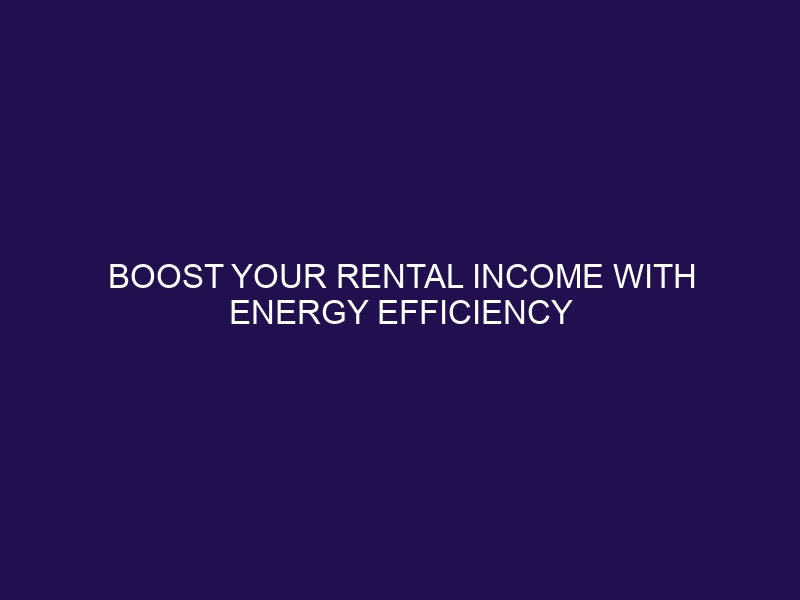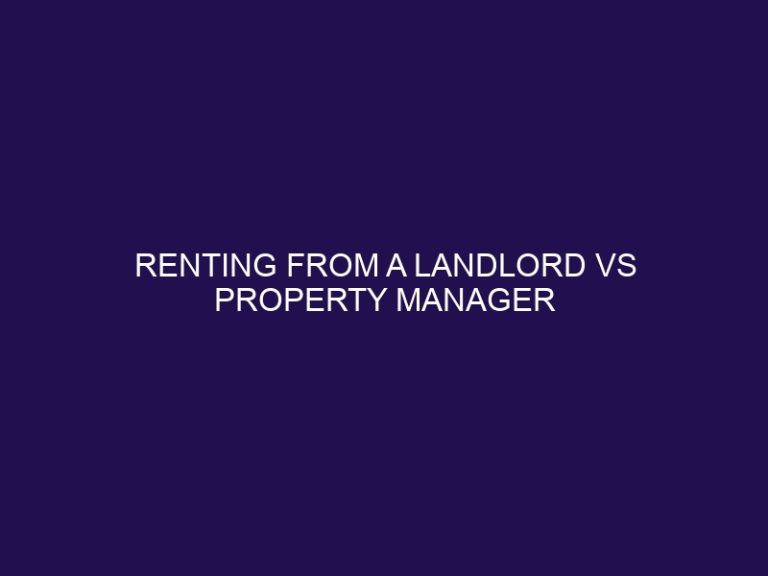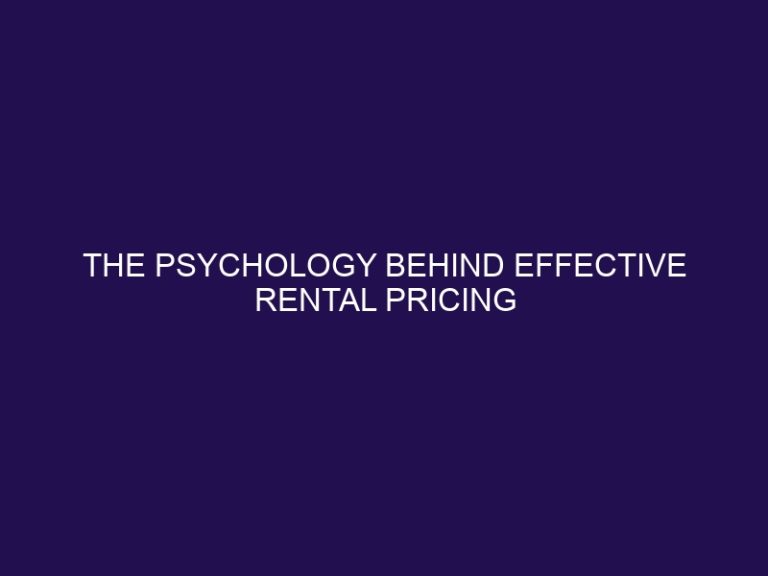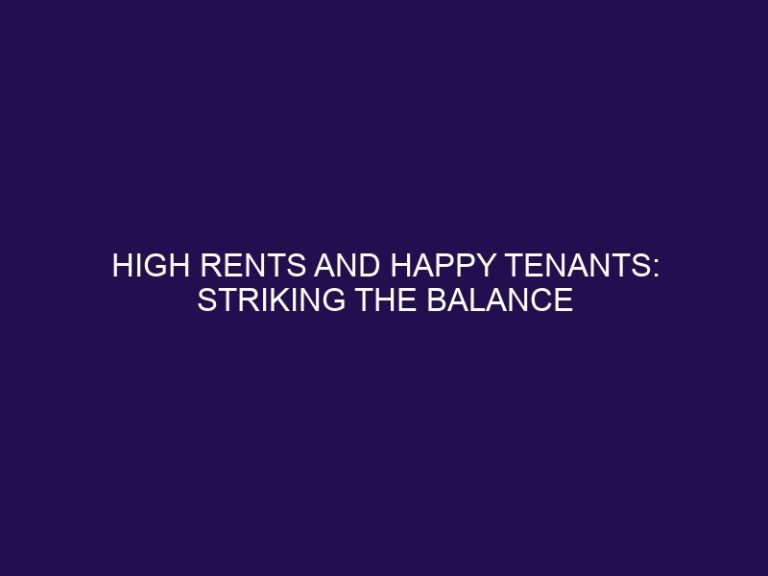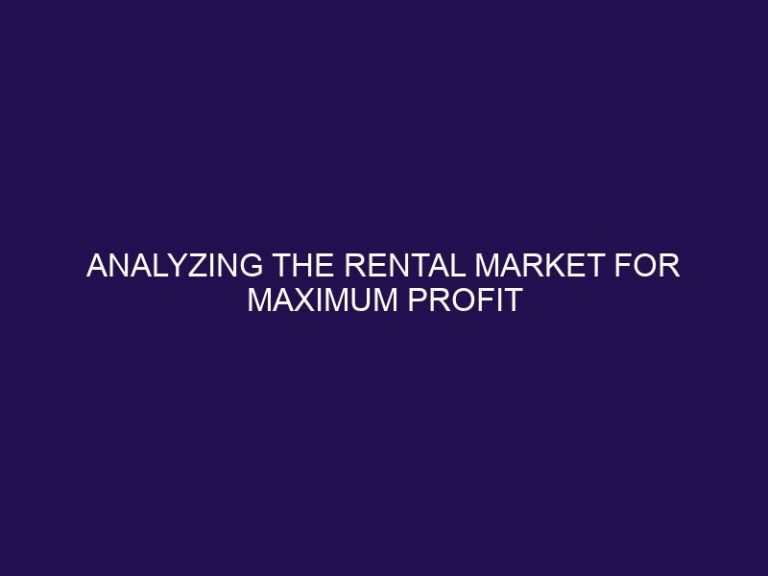Boost Your Rental Income with Energy Efficiency
Energy efficiency refers to the process of using less energy to achieve the same level of performance, resulting in reduced energy waste. In the context of rental properties, it involves implementing measures to reduce energy consumption, thereby improving the overall efficiency of the property.
Energy efficiency is crucial for rental properties as it not only benefits both landlords and tenants but also has a positive impact on the environment. According to the U.S. Environmental Protection Agency (EPA), buildings account for 39% of total energy use in the country, making it essential for property owners to embrace energy efficiency measures to reduce their carbon footprint.
Here are three reasons why energy efficiency is important for rental properties:
- Cost Savings for Landlords and Tenants: Energy-efficient rental properties can save both landlords and tenants money in the long run, as they require less energy to operate, resulting in lower utility bills.
- Attracting Eco-Conscious Tenants: In today’s environmentally conscious society, tenants are actively seeking out rental properties that prioritize energy efficiency and sustainability.
- Meeting Government Regulations: Many states and cities have implemented regulations and incentives for energy-efficient buildings, making it necessary for landlords to comply to avoid penalties.
So how can landlords improve energy efficiency in their rental properties? Here are five effective ways:
- Conduct an Energy Audit: An energy audit can identify areas where energy efficiency can be improved, such as insulation, lighting, and appliances.
- Install Energy-Efficient Appliances: Upgrading to energy-efficient appliances, such as refrigerators, washing machines, and water heaters, can significantly reduce energy consumption.
- Improve Insulation: Proper insulation can reduce heating and cooling costs, making it a valuable investment for both landlords and tenants.
- Use Renewable Energy Sources: Installing solar panels or using wind turbines can provide sustainable and cost-effective energy for rental properties.
- Educate Tenants on Energy-Saving Habits: Simple habits such as turning off lights and unplugging electronics can make a significant impact on energy consumption.
Implementing energy efficiency measures can result in potential cost savings for landlords, such as lower utility bills, tax incentives, and increased property value. Additionally, tenants can benefit from lower utility bills and a healthier and more comfortable living environment.
To encourage tenants to participate in energy efficiency, landlords can offer incentives, provide education and resources, and make energy efficiency a selling point when marketing the property. By prioritizing energy efficiency in rental properties, landlords can not only save money but also contribute to a more sustainable future.
What Is Energy Efficiency?
What Is Energy Efficiency? Energy efficiency refers to the practice of using less energy to accomplish the same task, resulting in reduced energy waste and costs. Some suggestions for increasing energy efficiency include:
- Installing LED bulbs
- Utilizing energy-efficient appliances
- Improving insulation
Why Is Energy Efficiency Important for Rental Properties?
As a landlord, one of the key factors in maintaining a profitable rental property is managing expenses. One often overlooked opportunity for cost savings is through energy efficiency. In this section, we will discuss the importance of energy efficiency for rental properties and the potential benefits it can bring. We’ll touch on how it can save both landlords and tenants money, attract eco-conscious tenants, and help meet government regulations. So let’s dive in and see how energy efficiency can boost your rental income.
1. Cost Savings for Landlords and Tenants
-
Regular Maintenance: Properly maintaining appliances and building systems can result in cost savings for both landlords and tenants.
-
Energy-Efficient Upgrades: By installing energy-efficient appliances and lighting, both parties can reduce their utility expenses.
-
Resource Sharing: Implementing strategies for sharing energy-saving tips and practices can lead to cost savings for both landlords and tenants.
2. Attracting Eco-Conscious Tenants
- Attract eco-conscious tenants by highlighting green features, such as energy-efficient appliances.
- In property listings, provide information on the building’s energy-saving initiatives.
- Showcase any renewable energy sources utilized in the rental property to further appeal to eco-conscious tenants.
3. Meeting Government Regulations
- Comply with energy efficiency standards by understanding local regulations.
- Meet specific energy efficiency criteria set by the government for rental properties.
- Stay informed about any changes or updates to energy efficiency laws and regulations.
How Can Landlords Improve Energy Efficiency in Rental Properties?
As a landlord, maximizing rental income is always a top priority. One way to achieve this is by improving energy efficiency in your rental properties. But how exactly can landlords go about doing this? In this section, we will discuss five practical steps that landlords can take to boost energy efficiency in their rental properties. From conducting an energy audit to educating tenants on energy-saving habits, these tips will not only help save money on energy bills, but also attract environmentally-conscious tenants.
1. Conduct an Energy Audit
- Conduct an Energy Audit to assess energy usage and identify inefficiencies.
- Inspect heating, cooling, lighting, and appliances using tools like infrared cameras and blower doors.
- Analyze utility bills and building structure to determine areas for improvement.
2. Install Energy-Efficient Appliances
- Opt for ENERGY STAR-rated appliances for increased efficiency.
- Choose appliances with smart features to maximize energy usage.
- Consider multifunctional appliances to reduce energy consumption.
A landlord installed energy-efficient appliances, resulting in a 15% decrease in energy costs for tenants, enhancing the property’s appeal.
3. Improve Insulation
- Assess the current quality of insulation and identify any areas that may need improvement.
- Consider adding weather stripping around doors and windows to further improve insulation.
- Upgrade the insulation in the attic, walls, and floors to reduce heat loss and improve overall insulation.
4. Use Renewable Energy Sources
- Assess the property’s potential for solar energy and strongly consider installing solar panels.
- Explore options for utilizing wind energy, particularly in areas with consistent wind patterns.
- Consider implementing geothermal heating and cooling systems for efficient climate control.
- Evaluate the potential for hydropower for properties located near water sources.
By integrating solar panels, reducing energy costs by 70%, and attracting eco-conscious tenants, a property owner in California successfully utilized renewable energy sources to enhance their property value.
5. Educate Tenants on Energy-Saving Habits
- Provide informational materials on energy-saving practices, such as reminding tenants to turn off lights and unplug devices when not in use.
- Offer incentives for energy-efficient behavior, such as rebates for reduced consumption.
- Organize workshops or webinars to educate tenants on sustainable living and ways to save energy.
Pro-tip: Consider creating a friendly competition among tenants to see who can reduce their energy usage the most!
What Are the Potential Cost Savings for Landlords?
Landlords can greatly benefit from investing in energy-efficient upgrades. These upgrades can lead to potential cost savings, such as reduced utility bills, longer-lasting appliances, and fewer maintenance expenses. Furthermore, energy-efficient properties have the potential to attract tenants who are willing to pay premium rents for sustainable living spaces.
What Are the Benefits for Tenants?
Tenants can reap numerous benefits from energy-efficient rentals, including lower utility bills, improved comfort, and reduced environmental impact. Not only that, but features such as LED lighting and smart thermostats also add convenience and modernize living spaces, leading to increased tenant satisfaction and retention.
How Can Landlords Encourage Tenants to Participate in Energy Efficiency?
As a landlord, increasing rental income can be a top priority. One often overlooked strategy for boosting profits is by promoting energy efficiency among tenants. In this section, we will discuss various ways landlords can encourage tenants to participate in energy efficiency practices. From offering incentives to highlighting the benefits of energy efficiency, there are multiple approaches that can be taken. By the end, you’ll have a better understanding of how to make energy efficiency a win-win situation for both you and your tenants.
1. Offer Incentives
- Provide rent discounts for tenants who implement energy-saving measures.
- Offer free installation of energy-efficient appliances.
- Give rewards for reduced energy consumption.
- Implement a referral program for tenants who promote energy efficiency.
2. Provide Education and Resources
- Offer workshops and seminars on energy-saving techniques and technologies.
- Create a resource library with guides, tips, and practical information on energy efficiency.
- Provide online resources, such as videos and articles, to educate tenants on energy-saving practices.
In the 1970s, the United States experienced an energy crisis due to an oil embargo. This led to widespread energy shortages and skyrocketing prices, prompting the government and citizens to prioritize energy conservation and efficiency.
3. Make Energy Efficiency a Selling Point
- Make Energy Efficiency a Selling Point: Highlight the energy-saving features of your property, such as efficient appliances and renewable energy sources.
- Emphasize Cost Savings: Illustrate the potential energy savings and reduced utility costs for tenants.
- Educate on Benefits: Explain how energy efficiency not only saves money, but also enhances comfort and reduces environmental impact.
Did you know? Energy Star-certified rental properties can attract eco-conscious tenants.
Frequently Asked Questions
What are some easy energy efficiency improvements I can make in my rental property?
There are several small changes you can make to improve energy efficiency in your rental property, such as sealing around windows and doors, swapping out incandescent bulbs for LED bulbs, installing exhaust fan covers, and investing in a programmable thermostat. These upgrades can reduce utility consumption and trim expenses.
Are there any legal requirements for improving energy efficiency in rental properties?
While landlords are not legally required to improve the energy efficiency of their buildings, certain cities and states may have additional requirements. For example, cities like San Francisco, Berkeley, and Los Angeles have energy efficiency requirements for rental properties, and landlords may be required to meet current building codes when renovating or replacing appliances.
What should I do with old or broken appliances in my rental property?
Landlords should properly dispose of old appliances by either collecting them for recycling or disposing of them appropriately. In some cases, landlords may be able to collect old appliances and exchange them for more energy-efficient models, potentially reducing utility costs in the long run.
How can I improve the energy efficiency of older rental properties?
Older rental properties, especially those with single pane windows and older appliances, may lose efficiency and hinder energy performance. Landlords can consider making upgrades such as installing double glazed windows, adding door sweeps, and improving insulation to reduce heat waste and lower utility consumption.
Can I increase rental rates by improving the energy efficiency of my property?
Improving the energy efficiency of a rental property can increase its value and rental appeal, potentially allowing landlords to charge higher rental rates. In some cities, landlords may also be able to increase rent up to 10% to offset the costs of decarbonization upgrades for rent-controlled buildings.
What are some tips for maintaining energy efficiency in rental properties?
Regular maintenance, such as periodic inspections and replacing air filters, can help maintain energy efficiency in rental properties. Landlords should also educate tenants on energy-saving practices, such as keeping windows and doors closed, using thick curtains to block sunlight, and not leaving electrical appliances on standby.

